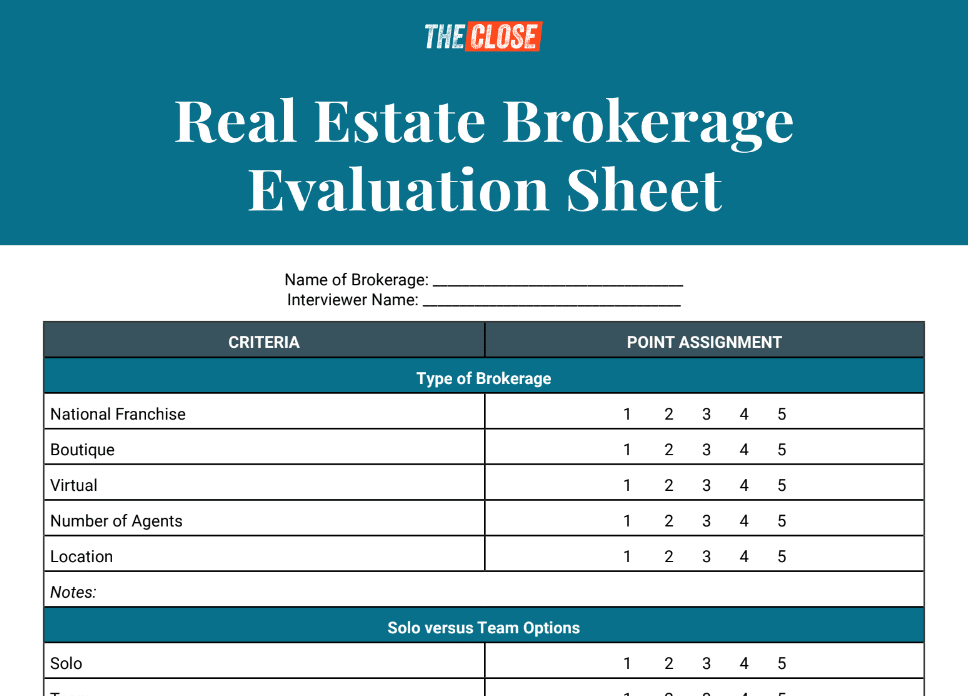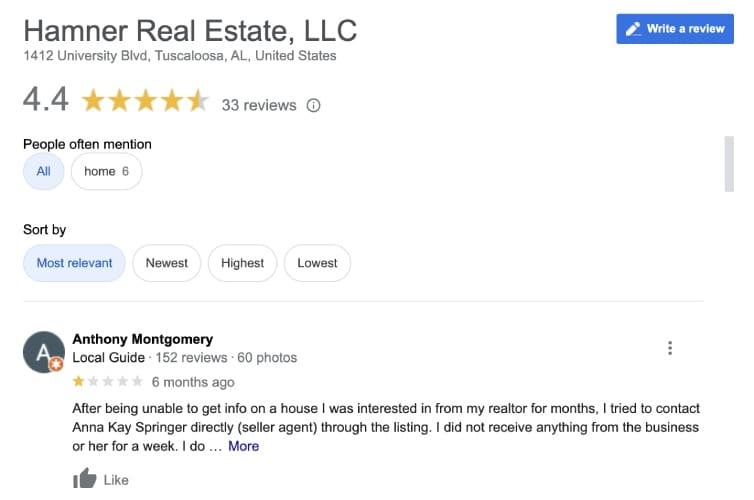Calling all new and budding real estate agents! Finding the right brokerage to start your career on the right foot is essential. Your brokerage should be an extension of you, your goals, and your reputation. Also, the brokerage you choose will impact your commission, expenses, and lead gen and marketing opportunities. So choose wisely! Luckily, you don’t have to fly solo here. Buckle up and follow my six steps to uncover how to choose a broker as a new agent.
Importance of Choosing or Joining a Real Estate Company
Picking the right real estate company or broker isn’t just a choice—it’s a strategic move that can shape your career. A reputable company or broker can offer the following:
- Invaluable mentorship
- Top-notch training
- High-quality leads
- Essential resources to help new agents kickstart their journey and assist experienced agents in expanding their businesses.
- Being associated with a well-known and respected firm can significantly boost an agent’s credibility and reputation in the market.
So, it’s crucial to thoroughly research and weigh potential brokerages’ reputation, support, and company culture, as this decision can profoundly impact your professional standing. If not, you might switch real estate brokerages or even face failure.
1. Create & Use an Evaluation Rubric to Help Decide Your Brokerage
Choosing a real estate brokerage for you and your business is like finding the perfect fit for a tailored suit – it’s not one-size-fits-all. Some agents thrive in the structure of a franchise brokerage, while others value a boutique brokerage’s unique support and culture. Whether you’re willing to invest in desk fees for valuable office resources and top-notch training or seek a more flexible arrangement, we designed our rubric to cater to your needs.
Print it out, and determine which characteristics best suit your needs on a scale of one to five. As you take notes during your research and throughout the interview process with each brokerage, rate each criterion based on this scale to give a score for each brokerage. This evaluation will help you decide which brokerage is best for you and your real estate business.

2. Decide Which Type of Brokerage to Target
Looking to kickstart your career in real estate? Remember, every real estate salesperson needs a sponsoring broker to represent clients in transactions. Knowing how to pick a real estate broker to work for can make or break your success in the industry. It is crucial to understand the various types of real estate brokerages and weigh their pros and cons before deciding.
 |  |  |
| Pros: Instant credibility, large audience Cons: More competition | Pros: Individualized attention Cons: Smaller marketing budget | Pros: Higher commission splits Cons: Less networking capital |
Explore and compare the distinctions among national franchise, boutique, and virtual brokerages to uncover the perfect match for you!
National Franchise Brokerages
Examples: RE/MAX, Century 21, and Keller Williams
National franchise brokerages are excellent for new and experienced agents who value mentorship, top-notch training, technological support, and a solid brand name. Let’s take a look at the advantages and disadvantages of working with a national franchise brokerage such as Keller Williams:
Pros:
Cons:
Consider joining a franchise brokerage with advanced tools and technology to save money as a real estate agent. A reputable franchise can help you build your trusted brand and provide a strong support network from thousands of agents. However, it also means more competition and fewer opportunities to make business decisions. Technology tools may limit flexibility, and reaching higher-ups outside your brokerage can be challenging.
Boutique Brokerages
Examples: Core Real Estate out of Manhattan, Stroyke Properties Group in California, and @Properties in Chicago
Are you a real estate professional who values tight-knit connections with colleagues, hands-on training, and direct access to leadership? Do you thrive in a specific niche market? If yes, then boutique brokerages might be the perfect fit for you! Let’s examine the advantages and disadvantages of working for a boutique brokerage.
Pros:
Cons:
When you’re learning how to choose a real estate brokerage to work for, boutique brokerages stand out for their diverse support, marketing, and array of tools. They also offer robust training programs, cutting-edge marketing systems, flexible strategies, and a tight-knit team atmosphere. You’re also more likely to experience a strong sense of camaraderie. However, boutique brokerages may provide you with a smaller marketing budget. It is also difficult for you to access enterprise-level technology, and brand recognition may be limited.
Each boutique brokerage should be evaluated individually without making assumptions about what is or isn’t included. Read our article 23 Questions to Ask a Real Estate Broker When Interviewing and download our free real estate brokerage interview questionnaire to be prepared and ensure you’re asking the right questions.
Virtual Brokerages
Example: eXp Realty
Virtual brokerages are ideal for seasoned agents seeking the ultimate flexibility and technological resources and tools. They can provide the best of both worlds for agents craving a high commission split and access to advanced technology. For experienced agents with an established reputation and client base, virtual brokerages can deliver the perfect blend of flexibility and automation tools to expand their business. Here’s a look at the advantages and disadvantages of joining a virtual brokerage firm like eXp Realty:
Pros:
Cons:
New or part-time agents should consider whether virtual brokerages are suitable for them. Although these brokerages offer high-tech tools and high commissions, there is far more to consider as you learn how to find a brokerage to work for. New agents usually need more localized support to build authority and networks in their area. Additionally, some virtual real estate brokerages require monthly fees irrespective of the agent’s production, which can be a risk for those who don’t consistently close sales.
3. Choose Between Going Solo & Joining a Team
When you’re learning how to choose a real estate brokerage to work for, you must understand the two ways you can work with them. The most well-known way is to go solo and operate as an independent real estate agent. The second option is to join a real estate team, which means that you work with a group or under a more experienced agent within your brokerage.
What It Means to Go Solo
Most new real estate agents plan on going solo when they enter the industry. Solo agents are independent, and all business responsibilities, like lead generation, nurturing, transactions, and accounting, are on your shoulders. You only have your real estate brokerage to lean on, which is another reason why choosing one that provides the level of support you’ll need is so important.
Even though going solo is a significant amount of work, the benefit is that you’ll earn more commission per sale. Solo agents keep the whole commission percentage agreed upon with their broker (e.g., 70/30 or 80/20). You don’t have to consult anyone to make marketing or business decisions. You have complete creative control over your business as long as it fits within your brokerage’s rules.

If you have a large sphere of influence, enough cash reserves to keep you afloat, or a marketing background, going solo might be your best choice. The downside of having autonomy as a solo real estate agent is that you don’t have help. You have to learn everything and build your business from scratch. You must try multiple lead generation strategies before finding what works in your area, which can take time, money, and effort.
What It Means to Join a Team
Joining a real estate team can be an excellent option for new or part-time agents, especially if they feel unsure. Team members often receive benefits like covered expenses and access to experienced mentors. The team will provide leads, allowing you to focus more on working with clients and less on marketing. Working with a team can help new agents gain experience and confidence quickly. Experienced agents not focused on scaling an individual business can also benefit from being part of a real estate team.

Many agents prefer the team environment and the flexibility of handing off tasks and clients to trusted team members. On the other hand, joining a team means a lower commission split since you’re typically working on deals as a team and splitting the profits. You’ll also sacrifice flexibility and autonomy by working on a team, which could be a benefit or a drawback, depending on your goals and motivation. Evaluate your short- and long-term goals to determine if a real estate team or going solo is right for you.
4. Compare Commission Plans
Every real estate company and brokerage will have varying commission splits, fees, and contracts. When deciding how to choose a broker as a new agent, make sure you understand the types of commission plans, typical fees, and contracts. Real estate brokerages generally offer three different types of commission structures. See the breakdown of each by clicking on the tabs below:
Traditional commission splits are fixed agreements (e.g., 50/50, 60/40, or 70/30). The agent receives a designated commission percentage on each transaction, which doesn’t change based on production or sales goals. Fixed or traditional commission splits generally come with minimal or no desk fees. Since they are the most predictable and risk-free commission split structure, they’re ideal for new or part-time real estate agents.
A high split plan means you will get a higher percentage of the overall commission, generally from 80% to 100%. While this sounds great, know that when you work for a real estate company with a high split model, they often implement other fees to recoup their expenses. These can be required monthly fees or per-transaction fees, so there is less predictability and more risk. High or no split commission splits are best for experienced real estate agents who consistently close sales to ensure a return on investment (ROI) on all potential fees.
Gradual or tiered plans are a happy medium between high and traditional split plans. They are often built on a graduated split system, so agents can increase their commission split as they reach sales goals. Tiered plans can start with a 50% to 70% split to the agent at the start of the year and increase to 100% when agents meet production goals. These plans are ideal for goal-driven agents of all experience levels.
5. Examine the Reputation of the Real Estate Brokerage
As you learn how to find a real estate brokerage to work for, it’s essential to evaluate the company’s current reputation in your local market. When you associate yourself with a brokerage, you also will be taking on the reputation of your sponsoring brokerage. Therefore, you should thoroughly research what community members think about the brokerage. Here are four ways to know if the potential brokerage has a strong reputation:
Ask Your Network
Are you looking for trustworthy feedback on a brokerage? Chatting with their clients is the best way to get the inside scoop. Ideally, try to reach out to local community members who are either currently in the market for real estate or have recently completed a transaction. Connect with your network through one-on-one conversations, social media posts, or through a Facebook group. A face-to-face or phone discussion is best; it lets you pick up on the person’s tone and expression and clarify any responses in real time.

Here are a few questions for your network:
- Have you heard of X real estate brokerage?
- Have friends, family, or acquaintances used the brokerage? Were they satisfied with their experience?
- What’s the first thing that comes to mind when considering the brokerage?
- What has your experience been with X real estate brokerage?
Review Press Mentions
Do a quick Google search for the agency or company and open the “News” tab to find related pages from other sources. Quickly scanning the results will show you how frequently they receive press, and just a few minutes of searching will show you what kind of publicity they’ve received. Many large companies will also have a press section on their website.

A brokerage with many local and national results shows they are well-known and generally respected. However, learning how to choose a real estate agency to work for means evaluating each brokerage’s strengths and weaknesses. Many small real estate brokerages have a more solid reputation than the most popular choices, but their publicity will be less.
Read Online Reviews
Studies show that up to 94% of consumers said a bad review convinced them to avoid a business, especially for buyers or sellers anticipating the largest transaction of their life. At the same time, online reviews are sometimes only given by people with solid opinions, whether negative or positive, so take them with a grain of salt. However, there should be a concern if the brokerage has many negative reviews.
Don’t forget to pay attention to the source of the reviews you look for. If you’re evaluating a Keller Williams office, nationwide reviews for the brokerage will not give you an accurate understanding of one individual location. Try looking specifically for Google business reviews for the most reliable reviews from clients for individual brokerages.

Most Google reviews are written by clients or people who have worked with the brokerage to buy or sell a home. In addition, it’s also valuable to find any online reviews from agents who previously or currently work for the brokerage from sources like Glassdoor or Indeed reviews. It’s always best to read reviews for the location or office you’re evaluating, but reviews for national and franchise brokerages can help you decide.
Look for Awards & Memberships
When checking out a brokerage’s website or social media, watch for any awards or accolades they’ve received. It’s also worth looking into their affiliated national associations or memberships. Some top-notch brokerages might not heavily promote their awards, so it’s a good idea to do a quick online search if you don’t see anything immediately. And if you come across a brokerage listed on the RealTrends 500 rankings, that’s a solid sign of their success!

6. Evaluate Additional Success Factors
Once you’ve established a basic understanding of the different types of brokerages and how they may or may not meet your needs, you’ll be able to evaluate each potential brokerage choice more accurately. Many other factors contribute to choosing a real estate company to work for, and with a base understanding of your needs, you can narrow the strengths and weaknesses of each. This scrutiny will dramatically increase your chances of finding success as a real estate agent.
These are some important additional factors to evaluate:
- Fees: Before signing with a real estate company, ask for a list of all the fees they might charge you monthly or yearly. You want to know all the costs upfront so there are no surprises later.
- Contracts: When you select a real estate company, you’ll sign a contract stipulating terms. You must read it carefully and ask questions if you need help understanding. Most companies want you to stay for a year, but you must know the rules before agreeing.
- Lead distribution strategy: Ask each brokerage how they distribute new leads to their agents. Since lead generation is a vital element of a real estate business, their strategy should be clear and easy to understand.
- Market share: A company’s market share shows its performance. If a company has many listings and each agent has about the same number, it’s a great place to work.
- Training plans: A real estate company’s training and mentorship programs are essential for agents. Without support from the company, agents might not do well.
- Culture and office setup: If you feel uncomfortable at the real estate office or find that it doesn’t match your personality, you’ll miss out on interactions and opportunities for support that can help you grow your business.
- Online presence: Some real estate companies don’t realize how important it is to be online, but the facts show that using the internet and social media to find clients is becoming increasingly influential. Even if not many people see it, being active online shows that the company knows about modern marketing and finding clients.
FAQs
Where is the best place to work as a realtor?
Finding the best places to work as a real estate agent is more than just looking at the average earnings or number of listings on Redfin. It’s also about choosing a place you enjoy and love. Based on population growth and median salary, the following are the top 10 best cities to work as a realtor:
- Virginia Beach, Virginia
- West Palm Beach, Florida
- Austin, Texas
- Tulsa, Oklahoma
- Denver, Colorado
- Dallas, Texas
- Seattle, Washington
- Washington, D.C.
- Las Vegas, Nevada
- Vancouver, Washington
Can a real estate agent work in any state?
Although certain regions have reciprocity with other states, real estate agents can only work in the state where they possess their licenses. If you are enrolled in prelicensing or real estate classes in one location, you should decide whether to work there or transfer to a different market.
Why is finding a broker to work for so important?
It’s not just a matter of finding a broker to work for. You need to find the right brokerage based on what we discussed in this article. You’ll have many questions, doubts, and learning experiences during your first year as a real estate agent. In terms of marketing, lead generation, and conversion, you will need more resources to compete with the major real estate brokerages when you first start. To launch your career, you’ll want to employ the brokerage’s tools and methods and their assistance in getting your name out there. That is why you must select a real estate brokerage who will walk this journey with you from beginning to end.
Bottom Line
Choosing the right real estate brokerage for your needs is one of the most significant factors in determining your career success. It can confuse new and experienced agents because every brokerage has unique strengths and weaknesses. To learn how to choose a broker as a new agent, you must thoroughly evaluate your needs and the brokerage’s offerings and use the evaluation rubric provided.














Add comment